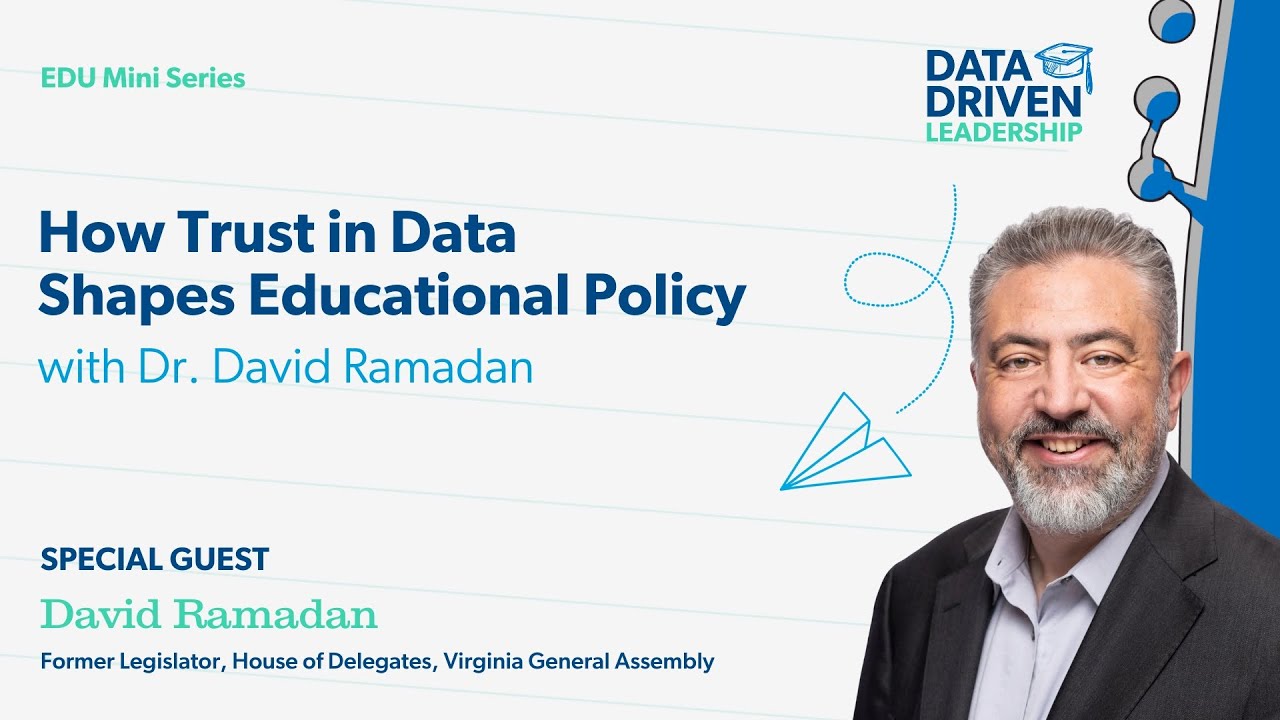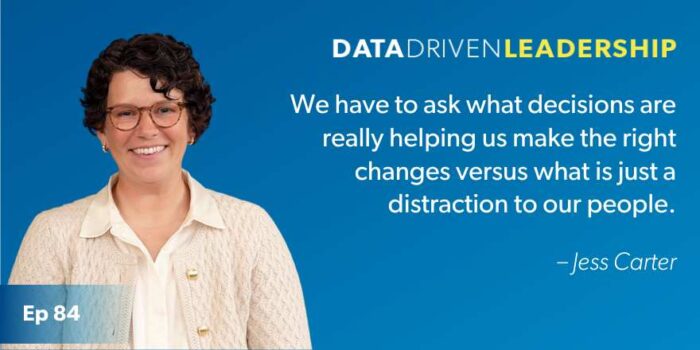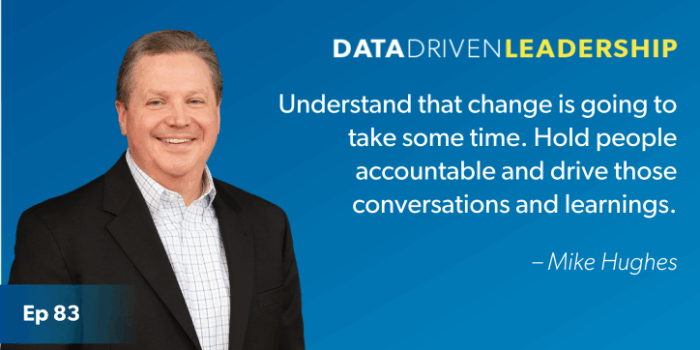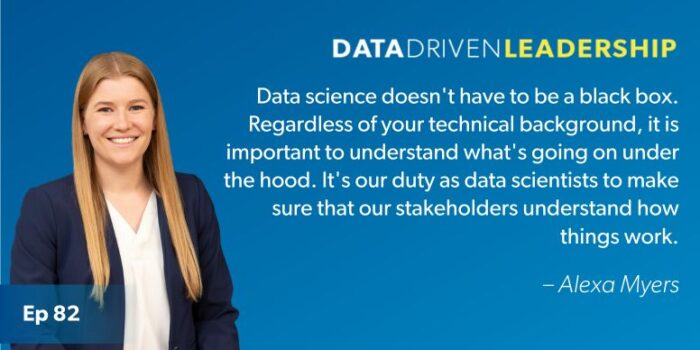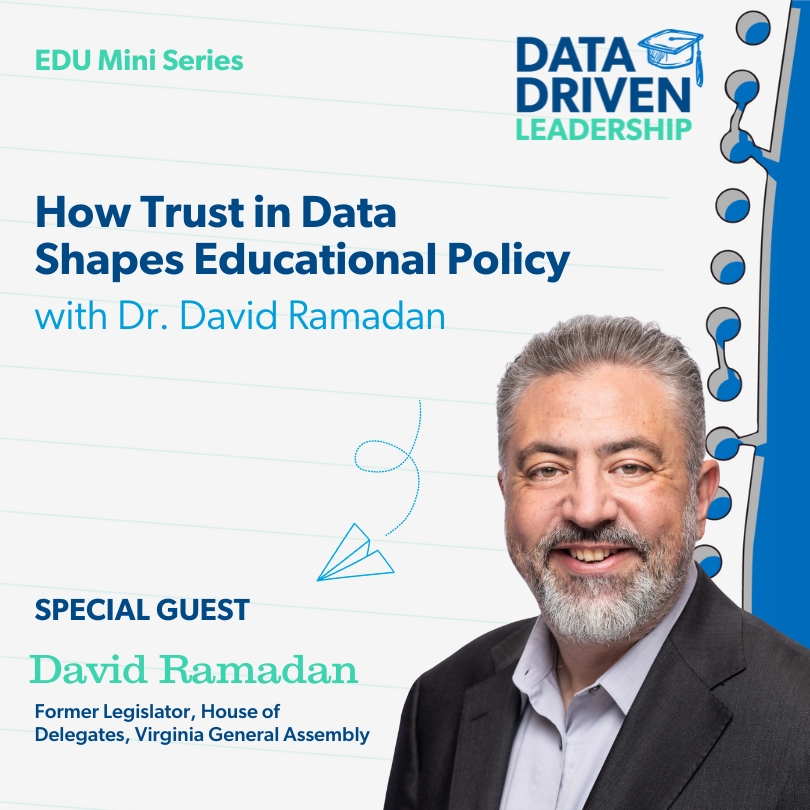
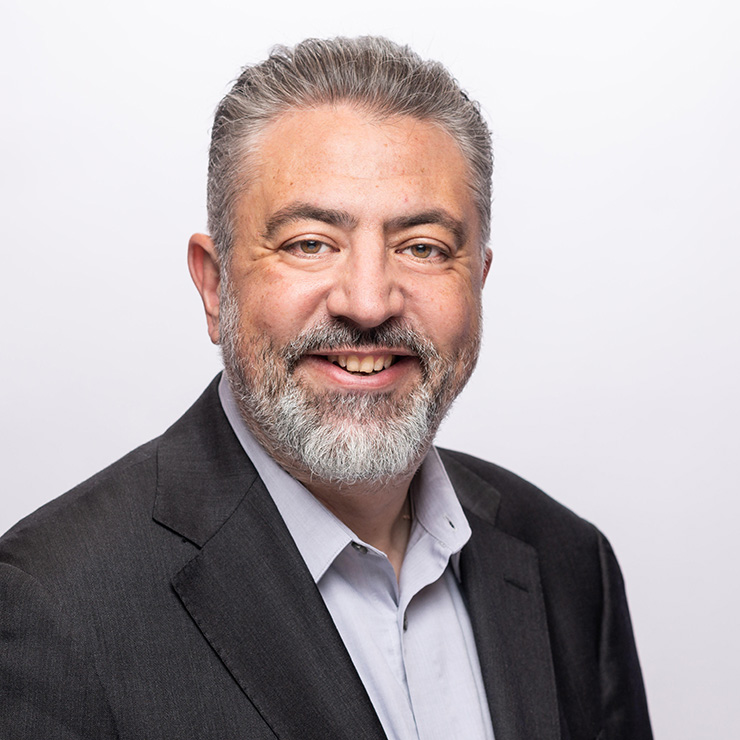
Transcript
Curt Merlau [00:00:02]:
Why is data so often used as a gotcha, especially in education? As a former teacher, administrator, and now consultant, it's a question that I ask myself all the time, which is why we're here. I'm Dr. Curt, and this is my takeover of Data-Driven Leadership.
In this four-episode miniseries, I'll be joined by several industry experts who have made it their mission to hunt, seek, and destroy the systemic barriers to learning. Through it and data, we'll share how it and data can not only meet unmet needs, but can actually accelerate opportunities when done the right way. In my role, I work with many state education leaders across the country, which in turn exposes me to a wide variety of new and exciting strategies. I look forward to bringing you these amazing leaders to share those strategies with you. Let's bring people, policy, and technology together so that data can be our greatest ally.
Curt Merlau [00:00:58]:
Diving into today's episode, you will have the pleasure to hear from Dr. David Ramadan. Dr. Ramadan is a seasoned executive and international consultant with over 25 years of advocacy, business and government relations experience. David has served two terms in the Virginia House of Delegates. He is also an alumnus of George Mason University, where he is now a professor of practice and on faculty. And from 2010 to 2012, he was a member of the George Mason University Board of Visitors, appointed by the governor of Virginia. David immigrated to the United States from Lebanon in 1989 after attending the International College in Beirut. He graduated from Mason with a bachelor's degree in government and politics and a master's degree in international trade and transactions. I had the pleasure of meeting David through my coursework at Vanderbilt University, and I actually defended my thesis in front of David, where he was the first to call me doctor.
Curt Merlau [00:01:59]:
And so I have a special connection with David. Really enjoyed our relationship and getting to know him and his work in this space. He brings an interesting perspective to the conversation, his experience as a policymaker, but his training as an educator and time spent as a consultant really gives a unique perspective into how people, process, and technology interact with policy. I hope you enjoyed today's conversation. Thank you for joining.
Hello and welcome to this episode of Data-Driven Leadership, the Education Miniseries. I'm your host, Doctor Curt, and today I am honored to have Doctor David Ramadan, who is a former House of Delegate member in the state of Virginia, professor, scholar, and I should also say, the very first person to call me, “Doctor” as I was going through my program at Vanderbilt and defending my Capstone project. And for that reason and many, many others, as you will all find out shortly, I'm excited to have Doctor David with us.
Curt Merlau [00:03:03]:
Welcome. Thank you for joining us today.
Dr. David Ramadan [00:03:05]:
Thank you. Doctor Curt. Love. Good to see you again. And it still sounds good as it did.
Curt Merlau [00:03:12]:
It does.
Dr. David Ramadan [00:03:13]:
The first time a few months ago.
Curt Merlau [00:03:15]:
It does, it does. Never gets old and just really appreciate you and your background and how you got to be where you are. I hope to get into some of that today because I think it's just so amazing to hear how you got to be where you are today. And so honored for you to share a little bit of that with us here on this episode. We are the Data-Driven Leadership podcast and so with that we take a focus around data/IT and, you bring a unique perspective to the conversation, having lived in the policy-making world, also as a consultant in the IT space as well. And so I expect to learn a lot from you, as I'm sure our listeners are as well.
So we're going to jump right in, and I'm curious if you could share with us your thoughts on the topic of data-driven leadership and specifically, from your perspective, given your history and your background, how can that be applied in shaping education policies to meet the needs of our students?
Dr. David Ramadan [00:04:25]:
It's an important subject, and a subject that despite everybody recognizing how important data is to education today, we still unfortunately are not utilizing data as much as we should, especially in policymaking. Online education, as you and I are proponents of, has not caught up.
Dr. David Ramadan [00:04:57]:
As much as we want it to do so, especially in traditional universities. And part of the reason is, I think, turf protection. If these universities, as our alma mater had figured out, really use data and really utilize the data that they collect on the need for agile education, the need for hybrid education, the need for remote and online education—and those can be synonyms, or they could differ quite a bit depending on the context of the conversation—they would realize that all forward education should be data-driven. Most of it should be online or some sort of an agile delivery, and should be the base for all education policies. But that is not the case. Today's education policies are a continuation of a way of deciding where we're going to go, turf protection, building more buildings in brick and mortar, protecting that brick and mortar, and feeling good about having students around us, whether we are serving them correctly or not.
Dr. David Ramadan [00:06:23]:
If we collected enough data and then if we analyze that data, we would be able to make sure that we perform better for students in an education field. We would have better feedback for educators, operationalize our services to be more efficient and get better uses of dollars that we are, that we are so short of all the time in education, therefore, we would allocate resources more effectively.
Now, I'm generalizing. I'm saying in general, we're not being as good stewards and as good of users of data-driven leadership in education policies. There are, of course, outliers to this, and there are some shining stars in this field. But in general, I think we still have quite a bit of quite a good work to do, especially in the policy decision-making when it comes to education.
Curt Merlau [00:07:34]:
And I appreciate that perspective. It's what you're describing is—and I've seen it, too—of people go into protection mode, self-preservation, maybe in the presence of data, and maybe it's out of fear of what it might show or say or the myriad of things. I think what you're touching on is that the mindset around data, a leader would be well advised to really self-reflect on how they think about and embrace data. Would you agree?
Dr. David Ramadan [00:08:10]:
100%.
Curt Merlau [00:08:11]:
100%.
Dr. David Ramadan [00:08:12]:
I'm actually recording this podcast with you while I'm on the road. I'm down here in Richmond, Virginia, helping advocate for a couple projects in Virginia. They're not education, but I'm going to use the data. They're not education-related, but I'm going to use the data aspect of that as an example, and I'm going to anonymize what those projects are. One project in particular is an economic development project that could bring in about 30,000 jobs to the commonwealth. The numbers are incredible. The data is incredible. The projections are incredible.
Dr. David Ramadan [00:08:58]:
Project is probably dead. It has 5% at this point, chance of surviving the General Assembly this year. Not because we didn't…because the data wasn't there, the data was there. It's because the data wasn't utilized. And the decision-making is happening based on political basis, not based on, not data-driven. We see that in education as well.
Dr. David Ramadan [00:09:24]:
If I stand the hallways today of any General Assembly, any legislature in the nation, you'll see the good, hardworking representatives of traditional universities that are roaming those hallways, pushing for the turf, pushing for protecting what they currently have, instead of coming around saying, look, the data shows the opposite of what we've told you for years, but that's fine. Let's utilize that and use it and use AI instead of stifle the innovation. You don't see those discussions happening, and I think it's some people like you and me. That's why I'm so excited to be on your show today or your podcast today, because we still have a lot of work in order to get innovation and data, in particular, driven discussions happening even at our research universities that are supposed to be mostly about data.
Curt Merlau [00:10:28]:
Yeah. And that's what I would love, for you to maybe share a little bit about your background and what brought you to the perspectives and the beliefs that you have, because as a researcher, as a scholar, you are looking at and holding data in one way, but you've also been, as you mentioned, in the House of Delegates within the commonwealth. So you've seen the political side of it, too. And what you just described is this politicalization of data. Sometimes people might describe it as the weaponization of data or just the stifling of the data. Yeah. How do we get there? We have a lot of work. How do we get there?
Dr. David Ramadan [00:11:05]:
Sure. So I ran for office in 2011 and had the honor, privilege of becoming the first adult immigrant in Jefferson's house. That's the longest running legislature in the western hemisphere. And little old me, immigrant from Lebanon, first-generation immigrant who came to this country with $2,000 in my pocket in a dream, ended up serving in the same house as Jefferson, Madison, and Patrick.
Curt Merlau [00:11:33]:
That's amazing.
Dr. David Ramadan [00:11:35]:
So it was truly an honor to serve. I served for two terms and then went back to the private sector. And I remain very involved in Virginia and in politics overall. There's never been a shortage of data. We're gathering it differently today. We're analyzing it differently. Data has always existed in policy-making, back from the founders days until today. The problem has been, continuously, is the mistrust in the data that brought us to what you call politicization of data, which is true, and it's because we don't trust it.
Dr. David Ramadan [00:12:14]:
Keep in mind that politicians, especially in modern-era politics, were elected officials. I don't want to call them politicians because there are a lot of truly citizen legislators all over the nation that are there to do the work. But elected officials, before they get into a policy-making position, they go through campaigns, campaigns that are dependent on polls, polls that are politicized, polls that are skewed one way or another. And we got to a point where the polls are unbelievable, right? And failing again and again and again, year after year, and brings these decision makers to a point where they don't trust the data.
So our role as researchers and as people that come from the academic world is to make sure to differentiate between political data and real data that is needed in order for them to do or to take the correct decisions or to make the correct decisions and the new tools that are out there, whether we're talking about AI, where we're talking about quantum computers that are doing incredible level of calculations, ought to be used to verify data, ought to be used in a way that gives trust in data. The collection of data is easy. Census has been doing it since mankind.
Dr. David Ramadan [00:13:56]:
It's how do we utilize it? How do we explain it? How do we bring it to a point where you can make decisions and nowadays be agile in those decisions, put it in a loop where you're moving quickly in reaffirming those decisions or changing those decisions based on the changing world.
Curt Merlau [00:14:18]:
You know, there's just so many different directions we could go in this conversation. I'm sure those who are listening are thinking of just a thousand questions that, you know, some of which are going through my mind, too. You mentioned trust, and that is such a critical element and an interesting topic given the state of where we are today and how a lot of people do feel around just politics in general, whether it be left or be right. But you mentioned trust and trust in the source and trust in the findings that brings with it a level of vulnerability and transparency. Right? Where have you seen that done particularly well? Or where have there been promising glimmers? Where you have seen trust be extended or generated between the citizenry and maybe a state agency or just the government at large.
Dr. David Ramadan [00:15:17]:
A little bit in education here, I think there is trust in past performances of students, trust in enrollment numbers per se, completion numbers, and matriculation numbers. You can't really fudge those nowadays, right? Nor can you play with them. And I think that had brought us to the realization of how many we are missing the boat on graduating from schools. I think I looked at, there are numbers in the millions across the nation of individuals that have some college but no college degree. Those are ranging between 20% to 25% of the population that has some college but no college degree. And that has been a number that it varies from one area to another. It varies if there is a big military base or not. It varies if we're counting community college as part of some college but no degree.
Dr. David Ramadan [00:16:33]:
However, overall, if we mix all that together, we get to a point where we are like, okay, we have a problem. We've discovered that problem because of the data that's out there. And the data says that we had about 20% of our population that got some college and never got a college degree. The data has not given us is where and what are these people doing nowadays. And I think one of these biggest in college education, talking undergraduate college education here, one of the biggest gaps is trying to figure out. All right. We know that is the number, but what age groups are they? Where are they today? What are they doing today? Do they still need that education or not? Are they all, are they all potential clients? I'm going to use the commercial word clients because I see education today as a client-based. Right?
Dr. David Ramadan [00:17:37]:
Students should be clients of universities and should be lifelong clients, lifelong learners, not just four years. So are these some college/no degree folks potential clients, or did they become somebody else's clients? Did they become somebody else's users of technology? Are they not in need of further education because of technology today? So there's a lot of data that's missing there. We started with good Senate data and data-driven decision making for a lot of money that was spent on this problem, by the way, with yet very little, very little success.
Curt Merlau [00:18:24]:
Yeah. Yeah. We collect mounds of data, right? Mounds and mounds of data. And we've talked at great length about state longitudinal data systems and how much states and the federal government have spent in amassing this large amounts of data. And what's the return? What is the change in practice or the improvement in outcomes? And not to say that there haven't been as a result of these systems, but I think to your point, it has seen little in return. And so what I appreciate you mentioning in that example, whether kind of knowing it or not, you're touching on this trust-building piece, and you laid it out in a very pragmatic way, I think, in that interpreting, discussing, analyzing data takes psychological safety. And to get there, we know that trust is critical, trust building. And so you mentioned a couple of things.
Curt Merlau [00:19:31]:
I jotted it down. You mentioned finding common ground. Where are we appreciative of one another and our roles and responsibilities? How do we demonstrate empathy for where each other are at? And then finally, and this is, I think the point you were just making of, like, resolving issues with data really says we can count on one another. And I think that full exchange is needed to really see the value in these enlarged data systems or using data-driven leadership in a healthy, productive, non-weaponized way. And unfortunately, I think because there have been instances where people have felt that maybe they've been villainized or data has been used against them, that that trust has eroded.
Dr. David Ramadan [00:20:17]:
Yes.
Curt Merlau [00:20:18]:
Yeah. What do you think of that? Am I totally off base or do you see some examples of that?
Dr. David Ramadan [00:20:25]:
You're absolutely right. It brings us back to a point that off-air we talked about, which is, which is creating data driven cultures, that culture needs to have in it multiple sets of individuals, not just individuals, or multiple types of players. One player is, of course, universities. The other players are definitely the IT professionals. And then the third stool here is got to be the decision makers, the political decision makers, whether they're policy or political. Or there could be the money decision makers, right? This could be private sector, it could be the venture capitalists in some scenarios. And when you put these together, they need to work together, they need to collaborate, they need to have a clear set of communication, and then there needs to be an arbitrator that guarantees two old players that they're all playing in clean sandbox here. There are no third rails that are trying to ruin what they're doing for the better good of society, whether that society at that point is education, whether that society is nuclear physics or that society is supply chain for food.
Dr. David Ramadan [00:21:58]:
We're dealing with a lot of environmental issues, right? I'll tell you what. We're dealing with energy production issues that requires all these sets of players as well. And I think education and the world of education and academics and academia overall has quite a bit of a role to play there, because let's use environment as an example. The role of academia and environment has been, unfortunately, over the last 20 years is to tell everybody that we have an environmental problem, right? Well, we do have an environmental problem. I think everybody at this point has realized, you know, we have an environmental problem.
The question becomes, okay, now what do we do about it? How do we solve this? And the misconception or the mistrust, going back to the trust decision has been on, on, okay, how do we use current resources versus no resources at all? Do we still use any of our, any of our natural resources that exist today? Or do we go totally off and don't use any of the fossil fuels? And there's been this mistrust in between where the data became missing. Right?
Dr. David Ramadan [00:23:15]:
Because I don't trust your data. You don't trust my data. You want me to get rid of all fossil fuel? They're like, no, no, you're a far whatever left environmentalist. And then the data becomes the victim here, versus the data being the base of that communication and that culture in between.
Curt Merlau [00:23:37]:
That’s a really great point.
Dr. David Ramadan [00:23:38]:
So the data here needs to be really the common. Not just common ground, but the common factor that we start with. This is the base.
Curt Merlau [00:23:48]:
Yeah.
Dr. David Ramadan [00:23:49]:
These numbers are facts. Facts should not be questioned because facts need to be facts, not opinion, not skewed facts, not… the data should be the fact of the problem. And based on that data, now we can differ on where and how we want to do things. We can differ on how long this should last or not. But we need to start with a culture that accepts data as facts and that's that data-driven culture versus, versus a culture that says, no, no, the data is an aspect here of this discussion. It should be the fact of the discussion. It could be the base, the common ground that we start here from here we go on.
Curt Merlau [00:24:42]:
I love that. And there's a big picture to share with data, and it's what you're describing. I was thinking, in my mind, we all run to our data points to justify or defend our position on a policy or on a particular initiative. And it's almost like we talk past each other because we are so either against that data as it being wrong or not accurate, or just can't believe it, and our data is right. I think what you're describing is we're missing the opportunity to say, let's just get curious about what this data is telling us. Yeah, yeah. And I love that because that's data as a strategic asset. And it kind of, you know, there's a direct relationship between, you can almost plot it on a horizontal and vertical axis to say, the level of trust in data as an asset and the level of maturity in people, process technology go hand in hand to get to that ideal state where you're optimizing your data.
Curt Merlau [00:25:40]:
And so it's, you know, we need data-driven culture for our agencies, for our governments, our organizations, and for our society, it sounds like.
Dr. David Ramadan [00:25:48]:
Absolutely. And you're showing off your true colors there, Dr. Curt. You're using x and y axis in the discussion, right?
Curt Merlau [00:25:58]:
I was not good in the quantitative. I'm a qual researcher all day long, but that data science class, abundantly in. But boy, do I have a great greater appreciation for it. Which leads me to say, as I have gotten more curious about data and learned more about it, I can appreciate it more. And sadly, we just don't take enough time, I think, to really listen what the data is telling us. I've often said data is a smoke signal to lead us to where the fire is. And it's a piece, it's an asset that we need to look at and ask it questions. Questions and challenge it, yes.
Curt Merlau [00:26:35]:
But not just dismiss it outright and miss what it has to tell us. Then it sounds like you agree. Yeah. Yeah.
Dr. David Ramadan [00:26:47]:
I like it, I like the smoke signal analogy.
We need to take the politics out of the data. I always see things because of my background and involvement in the political world, and I see how data is politicized all the time, whether it is data collected by cops on the roads, whether it is census data, whether it is the data of purchases and cell phone usages. I think the role of policy overall here, we're not talking just education. We're talking beyond education. The role of policy here is to make sure to anonymize the data and make data collection acceptable as that of that data-driven culture we talked about so that we can use the data for the betterment of society. If we're going to keep being cynics about the data and we're going to keep questioning the real need and usage of data collection in policy, it's going to be pretty hard to use that data. We’re going to continue to postpone the lack of the scientific analysis of data for better policy in education, and that could be huge because we could be spending a couple decades and hundreds of millions of dollars on less efficient…
Dr. David Ramadan [00:28:15]:
I'm not saying useless. I mean, I don't think we waste money on anything that is academic because you're always learning something. But with a world of finite resources, we need to better use those resources. And I think we can do that with better data or better use of data that is available out there.
Curt Merlau [00:28:37]:
And identify those barriers to learning or those inequities that have existed and, and not be an exercise in pointing fingers. But, you mentioned a couple of times. Where do the resources need to go? Where does the emphasis need to be? How do we change this outcome? It's really powerful to think about that. And so my last question for you, go on for hours, but my last question for you, are there specific areas within education policy where you believe advancements in technology, such as AI, will have significant impact, and how should policymakers prepare for these changes in light of everything we just talked about?
Dr. David Ramadan [00:29:29]:
I think. I think online education and personalized education is where AI could make a huge difference. We don't learn the same way. And even though there's always going to be the need and the advantage of people like yourself and I to sit down in a classroom anywhere and discuss and talk and negotiate and debate and think and plot and write and challenge each other's thoughts, the basic line of education that happens, especially on a graduate level, does not have to continue the same way we've done it. We don't have to put 30 kids in a classroom. In my mind, we don't have to give them their education in a classroom to start with. All 30 kids do not need to get the exact same message and same lesson plan, even undergraduate. I think we can personalize education.
Dr. David Ramadan [00:30:39]:
I think we can use IT for better and more secure delivery, especially when we're personalizing education, because we want to design it for them, we want to deliver it in a way that makes sense to them, and we want to make sure to secure it so that there's no question, is that personalized education going to jeopardize either my advancement or my lacking behind where everybody else is. So I think technology is going to be quite important to personalize education and to make sure that it's delivered where people need it, when they need it, whether that is on a degree level or whether on lifelong learning. I think we should have. We should have students that remain the clients of our educational system for life.
I joke. We used to, not joke, but I use the example of, it wasn't too long ago when we graduated kids from undergrad in a degree in computer science, or in IT, they could code and C++ and they're good for life. I mean, today you graduate IT and computer science, kids that can code in 20 languages, and in six months, those 20 languages could be antiquated.
Curt Merlau [00:32:11]:
Absolutely. Yeah, that's right.
Dr. David Ramadan [00:32:13]:
And so that part of personalized, lifelong learning is quite important. The question is, how are we gonna deliver it? How are we gonna track it with datasets that makes us continuous and agile so that we can continue to change and continue to make it worthwhile and do significant impact?
Curt Merlau [00:32:45]:
I couldn't agree with you more. I hear a lot of states talking about, from a policy perspective, the idea of graduation pathways and redesigning high school around these. Right? And I think this perfectly illustrates your point. They're personalized. Well, how do we help the student? How do we personalize or tailor, curate that experience that keeps their interests and abilities in mind and also the needs of this diverse, ever-changing workforce in mind. And that continuous, you're almost like recalibrating as you're progressing through a pathway.
Curt Merlau [00:33:25]:
It might take a little turn here or there, but technology, and I agree with you absolutely, can be a force for supporting the delivery and the monitoring, the tracking of these types of policies. And there's a great book, I'm still working through it, Recoding America. And I love how Jen describes this, that, and it kind of paraphrase the quote, but policy often fails on the jagged rocks of implementation.
Dr. David Ramadan [00:33:54]:
Yep.
Curt Merlau [00:33:55]:
And I think that's so true, especially in education. I hate to say it, we have these great, well-intended policies, and unfortunately, they're not either implemented with fidelity or integrity, or we lack the tools to support the delivery and the monitoring. And they fail because what we celebrate and what we prioritize is the policy making. And then we almost, I've seen it so happen so many times, almost kind of regulate the implementation out. And these policies don't get to live to their full potential. And I think what you just described is a road where, a path where we can use data and IT to help ensure our policies have the intended impact. And they're serving people well and they're not inadvertently creating wider inequities. So I love that.
Curt Merlau [00:34:47]:
I probably could do a whole other episode just on that topic.
Dr. David Ramadan [00:34:50]:
Absolutely. And look, that doesn't mean that every policy is going to be good or it's going to implement it correctly. It's going to be the correct policy. And that's okay. It's okay. Doomsday, it's okay. That's what evidence-based research is all about and continuously changing. Right?
Dr. David Ramadan [00:35:09]:
It's okay to have policies that don't pan out as long as we recognize that they're not panning out and recognize that quickly and be able to change quickly versus waiting decades to make the change when you’ve got generations that are missing out. Because we're not tracking where we are. And that's where data and data-driven decision-making and policy comes in handy to not only continue and advance the good policies, but also to be able to stop and recalibrate or refocus so that we can move away from bad decisions or decisions that at the time sounded good but ended up with unintended consequences.
Curt Merlau [00:35:55]:
That's right. That's right. Beautiful point. I think that is a perfect, a perfect ending to the conversation. I don't know that I can add much more beyond that, and I just want to, again, thank you for joining us. Thank you to our listeners for joining us on this episode of the education miniseries. I'm Doctor Curt, your host. Be sure to follow Data-Driven Leadership on your preferred podcast platform.
Curt Merlau [00:36:19]:
And don't forget to rate and review and share how these discussions on education data in policy are making a positive impact within your organization. Stay tuned for our next episode where we'll continue our exploration with more education experts.
Insights delivered to your inbox


